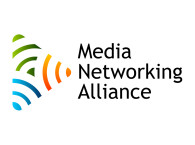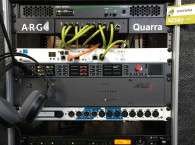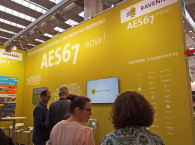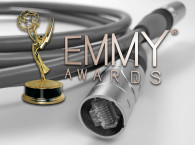
Held October 27–30 2014, this PlugFest demonstrated the functional compatibility of a number of different implementations of the AES67 standard for high-performance streaming audio over IP (AoIP) networks across a varied range of platforms and products. This standard specifically provides comprehensive interoperability recommendations in the areas of synchronization, media clock identification, network transport, encoding and streaming, session description and connection management.
The AES67 PlugFest event, put on by the AES Standards Committee (AESSC), offered an exclusive chance for manufacturers to test and experiment with the AES67 networking standard protocols in a controlled environment, overseen by AESSC members. Over the three-day event, 16 different networked-audio products with AES67-specific extensions were tested, with participating brands including ALC NetworX GmbH, Archwave AG, Axia Audio, Digigram SA, DirectOut GmbH, Georg Neumann GmbH, Lawo AG, Merging Technologies S.A., SOUND4 and Telos Systems, Inc.
The PlugFest provided a commercially-neutral context for engineers from these manufacturers to connect their equipment to that of other developers and to confirm, through testing, that signals are transmitted and received correctly according to the standard, in the practical interests of all participants.
“We are very pleased with the recent success of our ‘PlugFest’ event in Munich last month, as we continue to gather further research in interoperability for the implementation of AES67,” stated Bruce Olson, AES Standards Committee Chair. “With the participation of leading manufacturers, this hands-on event was able to clearly and reliably demonstrate the AES67 audio networking standard in a controlled environment across a number of different platforms. The AES Standards Committee continues to provide the most rigorous testing and development within the professional audio community, and these events help to strengthen our mission to standardize and educate our latest developments for audio professionals worldwide.”
About AES67-2013
The AES67-2013 standard defines an interoperability mode for transport of high-performance audio over networks based on the Internet Protocol. For the purposes of the standard, high-performance audio refers to audio with full bandwidth and low noise. These requirements imply linear PCM coding with a sampling frequency of 44.1 kHz and higher and resolution of 16 bits and higher. High performance also implies a low-latency capability compatible with live sound applications. The standard considers latency performance of 10 milliseconds or less. This standard provides comprehensive interoperability recommendations in the areas of synchronization, media clock identification, network transport, encoding and streaming, session description and connection management.
For further information on the AES67-2013 standard visit the AES Standards page here. The full report on the event, titled “AES-R12-2014, Report on AES67 interoperability PlugFest, Munich 2014” is also available on the AES website.
www.aes.org






